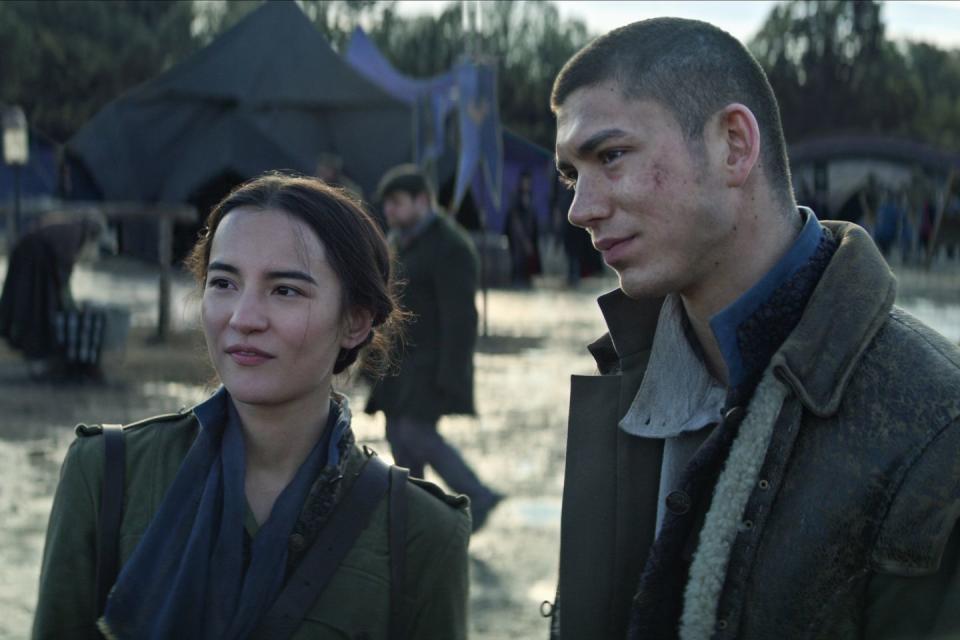Why the 'Shadow and Bone' Creators Changed Alina's Ethnicity for the Netflix Show

- Oops!Something went wrong.Please try again later.
- Oops!Something went wrong.Please try again later.
The Grishaverse—the encyclopedic fantasy series written by Leigh Bardugo, including the first book and title of the Netflix adaptation, Shadow and Bone—draws mostly from European and Asian history. Though the franchise includes several nation states, so far in the Netflix series we've been introduced to just three: Ravka, Fjerda, and Shu Han. The series protagonist, Alina Starkov, we are told, was born in the border regions of Shu Han and Ravka and is herself part Shu.
In the book series, however, Alina was full Ravkan, Ravka being the Grishaverse’s stand-in for Czarist Russia. (Though, Ravka was also inspired by 16th century Amsterdam, Bardugo has said.) The Ravkan language appears to have many Russian cognates and spelling similarities. The name “Starkov” even features the common Russian surname suffice “ov.”
For the Netflix series, the writers decided to change Alina’s ethnic identity, making her part Shu. “I’ve been very candid about the fact that when I wrote Shadow and Bone, it was my first book,” author Leigh Bardugo said in an interview. “And I think I was unconsciously echoing a lot of the straight white fantasy that grown up on. … And when [writer] Eric [Heisserer] and I first sat down together, one of the first things we decided was that we wanted Alina to be half Shu.” Alina Starkov actor Jessie Mei Li said in another interview that the choice made sense for Alina’s character: “I think it adds a lot more to sort of understand who she is as a person and why she doesn't feel worthy. Because her journey starts off as ‘I'm no one, you know I'm just an outsider’ to suddenly being like ‘no, this is where I belong.’”
But why does being Shu mean being an outsider? And who are the Shu Han?

What does Shu mean?
Linguistically, the country of Shu Han signals a fictional debt to Chinese language and history. In fact, Shu Han was directly inspired by various periods of dynastic China. (“Han” was China’s second imperial dynasty. Han is also China’s dominant ethnic group.) The Shu language features Chinese and also Mongolian roots. Much of the country’s geography was likely inspired by Mongolia.
Although we haven’t yet seen Shu in the Netflix series, the country is known in the books for their scientific advancements and inhumane experimentation on Grisha for research. Ravka, which lies between Fjerda (to the north) and Shu Han (to the south), has been at war with both countries for years. It make sense, therefore, that Ravkan citizens see Alina as an enemy and that there exists ethnic tension in the southern regions of Ravka, where both Ravkan and Shu ethnic groups reside.

As Li points out, Alina’s perception of herself as an outsider is only intensified by her ethnic identity, which puts her into conflict with both Ravkans and Grisha. (We’ll likely learn more about the Shu’s treatment of the latter next season.) Her identity, however, is not all that defines Alina. “I think, for lots of people [who are] mixed-race or first-generation immigrants, you spend so much of your life not feeling like you belong anywhere,” Li, who is half Chinese, explained in an interview. “My race is a big part of my life, but it’s not everything that I am, and they’ve done such a good job of making Alina’s background important to her as a character and important to shaping who she is, but it’s not everything that she is.”
Discovering the rest of that identity is what a hero’s journey is all about.
You Might Also Like

